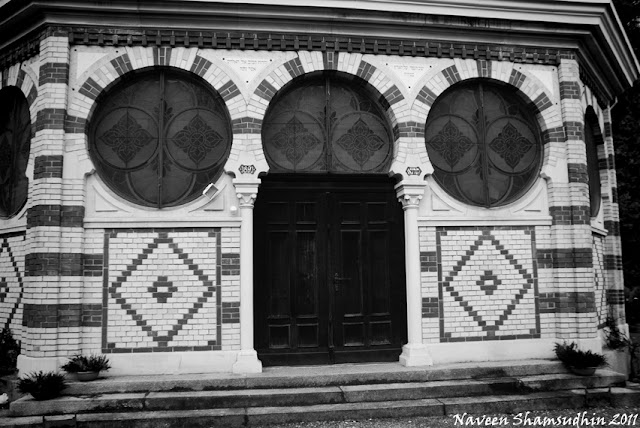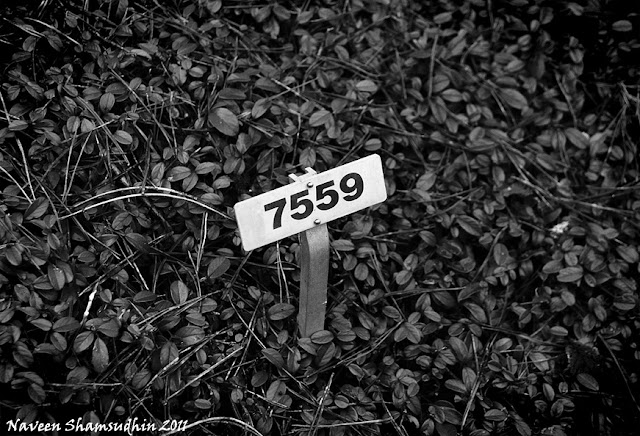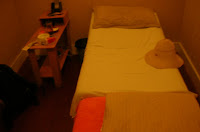Not only the Medina, but the whole city of Tunis, normally a buzzing, loud, busy place, was shut down. A few people could be seen hurrying home, and a few unlucky soldiers were guarding the empty government buildings. Here and there in some quiet street corner a group of men would be barbequeing a lamb's head or some other body part using a blowtorch, and here and there splotches of dried blood on the pavement show where an animal had been slaughtered. Apart from the slaughtering, the only other activity that could be observed on the streets of Tunis was the occasional rattling of an empty tram as it trundled towards or away from the central terminus. The trams that day were free, given that all the inspectors and ticket sellers had gone home. Even the youth hostel was opened by a middle-aged European lady, who said: "The manager isn't here. It's a holiday you know, everyone has gone home. I think I'm running the place now!" She's a guest herself and had been staying in the hostel the past month.
***
Two days earlier I had booked the ferry in Civitavecchia, bound for Tunis. The previous boat was booked out, and this one was packed full, possibly overcrowded. In the walkways, gangways, in the cafes, everywhere, there were prone bodies or groups huddled together and chatting. It seemed like the whole Tunisian community in Europe was going home. In my cabin were three Tunisian gentlemen working in Switzerland. One spoke English and was from Sfax, another kept dancing and making funny faces, and the third alternated between terrorist jokes and lecturing very seriously about Islam. They make the journey often, and told me the boat is usually one-third full. Unusually, it was also late in departure due to bad weather, and when we finally slipped out into the Tyrrhenian Sea at around 11pm, it felt more like being on a dingy rather than a large passenger boat.
The weather didn't clear the next day either, and we docked in Palermo to see it out. This meant an extra day's delay, and since Eid was on the following day, the passengers were not happy! A large crowd had gathered at the reception and several people were shouting angrily at the stewards. Most of the passengers sat resignedly or paced the decks, smoking and drinking coffee. In order to placate the crowd the stewards announced that there would be free dinner for all passengers beginning at 7pm.
Now, the diner itself is quite small, being able to sit about 100 people in a squeeze. In an overcrowded boat full of anxious and nervous passengers this announcement was asking for trouble! By 6:40pm the entrance to the diner (whose glass doors were closed) was completely packed full of people. You could hardly move an arm, and once in the crowd it was impossible to escape, you simply moved with the crowd.
By 6:50pm there was some chanting and screaming by a few "ringleaders". By 7pm the doors hadn't opened, so a few people jumped the small fence separating the queue from the diner, which of course made more people want to jump in or exchange angry words. The poor security guard was completely helpless, and by 7:20pm when the cooks were finally ready to serve, the crowd was a ravenous mob. The guard nervously unlocked the glass doors and whoosh! A mass of screaming, pushing men surged into the entrance, and only the arrival of more guards stemmed the flow by the frantic closing of the doors.
This process continued: once the queue inside the diner was manageable, the nervous guard unlocked the door and whoosh! A crush of swirling bodies, some people facing odd directions, others pinioned onto columns or wall features - and just as quickly as it started it stopped - the diner queuing area was completely full within seconds and the guards managed to shut the glass doors. The mob was stuck again into a frozen mass, hungrily eyeing those already eating in the diner, waiting for the next nervous opening of the doors.


[Caption: Palermo and the mountains of Sicily, the pilot coming out (left); waiting for underdone fish and overdone beans aboard the ferry (right).]
***
We finally arrived in Tunis bay the next morning, 12 hours late. It was the day of Eid. The skies were blue, the sea shimmering under the low, autumn sun. The green hills of Africa loomed in the near horizon and the white-washed houses of Sidi Bou Said twinkled on the starboard beam. A few freighters were at anchor inthe bay, keeping us company.
Half an hour later, I noticed the same scene. The exact same scene - the boat had stopped! It was Eid and apparently the harbour pilot wouldn't be coming out for another 2 hours! We finally docked at noon, and having learnt from my previous mistake I stayed well away from the crowd gathering on the lower deck and instead observed the disembarkment from the upper weather deck. Tiny people were streaming out of the ferry, cars were honking madly with joy, and the people would very soon be home.
We finally arrived in Tunis bay the next morning, 12 hours late. It was the day of Eid. The skies were blue, the sea shimmering under the low, autumn sun. The green hills of Africa loomed in the near horizon and the white-washed houses of Sidi Bou Said twinkled on the starboard beam. A few freighters were at anchor inthe bay, keeping us company.
Half an hour later, I noticed the same scene. The exact same scene - the boat had stopped! It was Eid and apparently the harbour pilot wouldn't be coming out for another 2 hours! We finally docked at noon, and having learnt from my previous mistake I stayed well away from the crowd gathering on the lower deck and instead observed the disembarkment from the upper weather deck. Tiny people were streaming out of the ferry, cars were honking madly with joy, and the people would very soon be home.
[Caption: a happy mob disembarking in Tunis (left); a happy mob singing aboard the ferry (right).]

















































